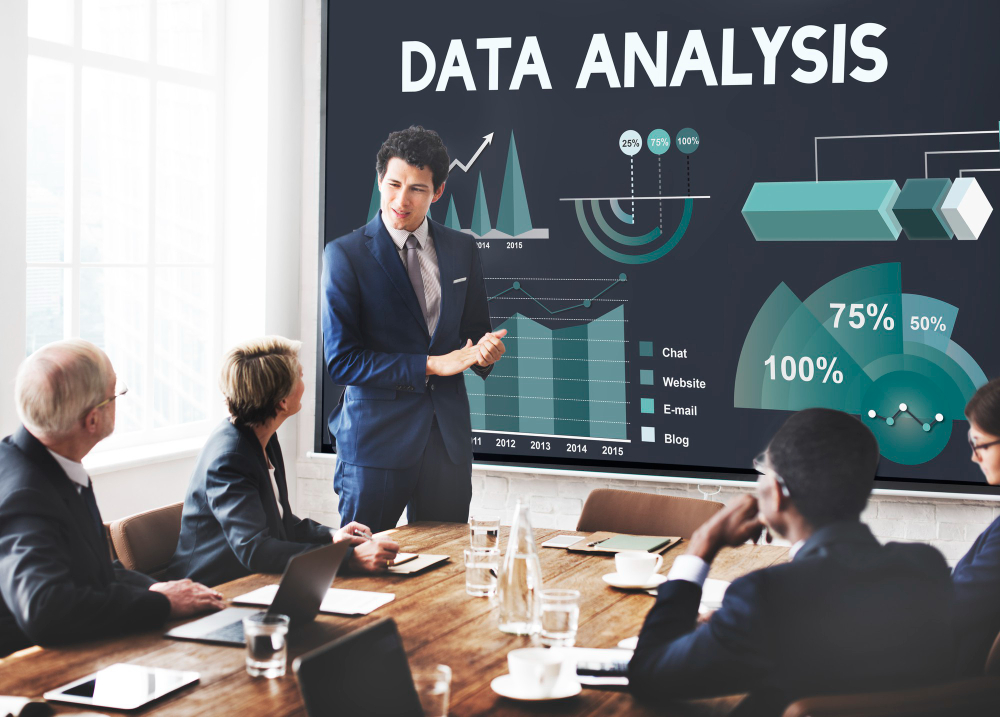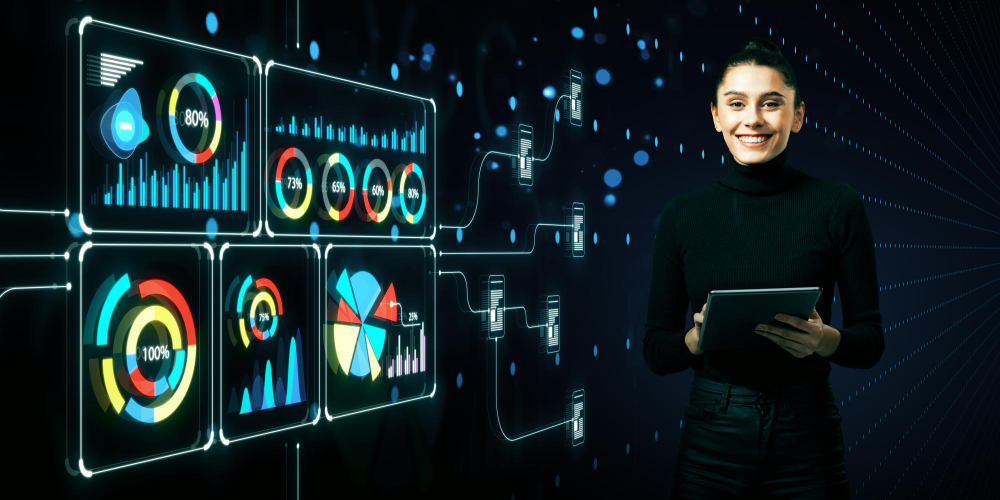Data Science vs. Data Analytics: Understanding the Key Differences
Have you been confused about the differences between data analytics and data science? Do you want to find out which of these might be “the one” for you? We got you!
Understanding the specifications and job roles in data analytics vs data science is crucial and the first step in pursuing a career in artificial intelligence and related fields.
Data science has a much broader scope as compared to data analytics. The former deals with collecting and analyzing data to develop algorithms, manage cyber security systems, and modify AI-driven automation tools while the latter focuses on converting vast data into readable, descriptive formats using analytical tools.
Continue reading to further dive into the nuances of data analytics and data science and understand the career prospects in these disciplines.
What Is Data Analytics?
Data Analytics is a field that primarily deals with the processing and analysis of data. It includes collecting large amounts of data, checking them for inaccuracies, duplicates, and possible omissions, and cleansing them.
Professionals process this data using statistical tools, and data visualization techniques to understand the numbers and analyze them, drafting descriptive reports that facilitate forecasts and predictions and ensure data-driven choices in businesses and organizations.
Read Also: How to Become a Data Scientist After 12th: Complete Guide to Mastering Data
Data Analytics is a subset of data science that simplifies data by scaling them and inferring actionable conclusions. It enables professionals to build predictive models and develop new algorithms.
What is Data Science?
Data Science is a broad field that focuses on collecting, studying, and analyzing data and developing algorithms and predictive models to forecast future trends in sales revenue, consumer behavior, and more.
Data scientists are highly skilled professionals with advanced degrees, certifications, and experience that allow them to study diagnostic reports and create, update, and modify algorithms. They work closely with data engineers and analytics teams to accurately run AI-powered automated systems.
It is an innovation-driven discipline that extracts essential information from conclusive reports and helps companies make data-driven decisions that align with the current trends.
Understanding The Differences Between Data Science and Data Analytics
Data Analytics is a part of the broader field of Data Science that focuses on the descriptive and diagnostic interpretation of data.
Data science on the other hand involves analysis and forecast using programming, AI and ML, and advanced statistical tools.
Here are some key differences in approaches and daily tasks that will help you distinguish between the two and choose the right career path.
| Parameters | Data Analytics | Data Science |
| Meaning | Data analytics is the study of existing data to find patterns and trends. | Data science is the process of analyzing complex datasets and creating predictive models and algorithms based on them. |
| Objective | Understanding gaps and recognizing pain points and problems in marketing, sales, and other strategies. | Forecasting trends that will drive the market, enabling data-driven decision-making, and developing automated systems. |
| Focus | Data analytics focuses on collecting, cleansing, scaling, and visualizing data to draw possible conclusions and analysis. | Data Science focuses on processing actionable and conclusive reports and developing recommendation models, security systems, and more. |
| Tools Used | Data processing and visualization tools including SAS, SQL, Excel, and Tableau. Basic programming languages like Python or R. | Programming languages like Python, R, Java, C++, and Perl. AI and ML, and Advanced statistical tools. |
| Approach | Insight-oriented and explanatory approach. | Action-oriented and exploratory in nature. |
| Goal | Provide diagnostic and descriptive inferences that facilitate forecasting. | Building models and algorithms for forecasting and security. |
| Outcome | Dashboards, elaborate reports, and insights. | AI-based automated systems, predictive models for identifying future trends, fraud-detection tools, and recommendation systems. |
| Data used | Existing structured data. | Existing, unstructured, synthetic, and real-time data. |
| Methods | Retrieving data from databases, cleansing, visualizing, and preparing dashboards. | Deep learning, artificial intelligence and machine learning (AI & ML), data modeling, and Natural Language Processing (NLP) |
| Difficulty Level | Easy-intermediate with user-friendly tools, basic statistical and mathematical concepts, programming languages, and simple techniques. | Difficult-complex with advanced programming, mathematics and statistics, and knowledge of AI and ML. |
Read Also: Business Analyst vs. Data Analyst: Key Differences Explained

Skills Needed to Study Data Science vs. Data Analytics
If you want to become a data scientist or a data analyst, you need to assess your skills and understand what field suits you the best.
Here are some key skills and knowledge you must work on if you want to pursue data analytics –
- Strong data visualization skills and familiarity with different methods of visualizing data – charts, and graphs – and interpreting them
- Statistical and mathematical abilities to scale and comprehend data.
- Knowledge of relevant programming languages like Python and R.
- Expertise in tools like Excel, SAS, Tableau, and SQL.
Data science requires a more advanced approach, including –
Read Also: Top Data Science Tools You Need to Know in 2025
- Advanced skills in mathematics like linear algebra and calculus and a deep understanding of statistical concepts.
- Knowledge of artificial intelligence and machine learning.
- Familiarity with the tools and techniques of developing, modifying, and updating algorithms.
- Advanced programming to develop high-end security and recommendation systems.
Educational Pathways for Data Analytics Vs Data Science
One of the core differences in jobs in data analytics and data science includes the type and level of professional education, training, and certification you need.
The following table provides a list of courses and paths you can take –
| Educational Route | Data Analytics | Data Science |
| Bachelor’s Degree | B.Sc. in Data AnalyticsB.Sc. in Computer ScienceB.Sc in MathematicsB.Sc. in Statistics B.Sc. in Business Analytics | B.Sc. in Data ScienceB.Sc. in Computer ScienceB.Sc in Applied MathematicsB.Sc. in Statistics B.Tech in CSE |
| Master’s Degree | M.Sc in Data AnalyticsM.Sc. in Information Systems | M.Sc. in Data ScienceM.Sc. in Applied Mathematics M.Sc. in Statistics |
| Certifications | Data Analytics Certification in ExcelTableau CertificationCertification in Advanced Statistical Tools | Certification in AI and ML Certification in Advanced Data Science Certification in Data Engineering |
Career Prospects
Wondering what jobs you can get after a course in data science or data analytics?
From finance and telecommunications to retail, digital marketing, and media and publishing – there are well-paid jobs across industries that recruit freshers and experienced professionals each year.
Some popular Jobs in Data Analytics include –
- Data Analyst
- Business Analyst
- Quality Assurance Analyst
- Marketing Analytics Manager
- Financial Analyst
- Database Administrator
- Risk Analyst
Some popular Jobs in Data Science include –
- Junior Data Scientist
- Data Scientist
- Data Engineer
- Machine Learning Engineer
- Data Architect
- Business Intelligence Developer
- Statistician
Owing to the difference in complexity and job descriptions, data science professionals typically earn more than those working in data analytics. On average, a data analyst in India earns anywhere between ₹6,00,000 – ₹8,00,000 whereas a data scientist can earn around ₹11,00,000 – ₹13,00,000 per annum.
Read Also: The Role of Machine Learning in Modern Data Science

Conclusion
In a technologically advancing, data-driven world, being acquainted with the approaches in Data Science vs. Data Analytics is the key to a rewarding and future-proofed career.
If you are intrigued by numbers and data and want to analyze them, explain insights and findings, and draw meaningful conclusions, data analytics could be the right path for you.
Read Also: How to Develop a Data-Driven Mindset: Tips for Aspiring Data Scientists
However, if you want a more exploratory path and want to use your knowledge of programming, AI and ML, and mathematical concepts to develop models and algorithms and work towards action-oriented goals, data science might be the perfect career choice.
Enroll yourself in a professional course to get your hands on state-of-the-art facilities and industry tools and resources that would help you kickstart your career. Check out AAFT’s School of Data Science for relevant courses and get a headstart now!











